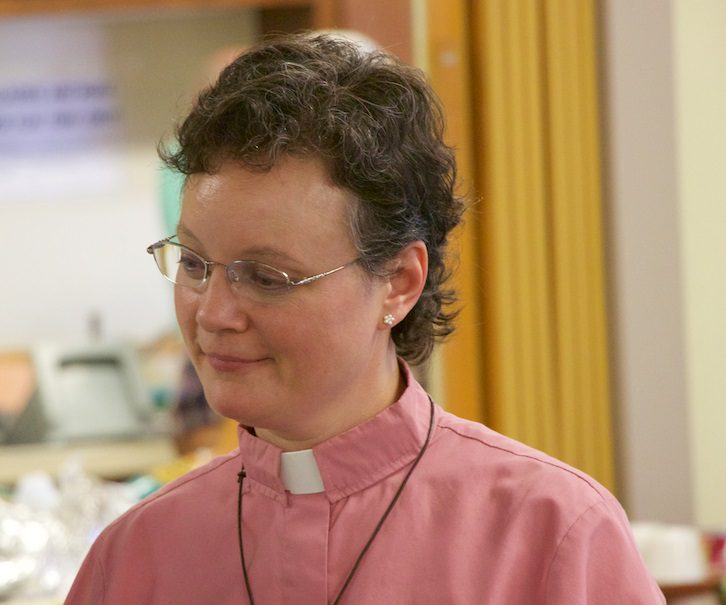Mary, Pondering and God-bearing: Part One
Read: Luke 1:26 – 38; 44b – 55
Mary ponders.
Did you catch that? In Luke 1:29 after hearing the startling announcement that she, a teenage girl engaged to be married, has found favor with God, Mary stops to think about that. We’re told that she is perplexed and “ponders” what’s going on here. The Greek word means that she is turning things over in her mind. She’s thinking. She’s not a vacant field in which God will plant the seed of the Messiah. She’s not a servant to be ordered around.
I’ve always loved this particular painting of the Anunciation by Henry Ossawana Tanner (1898). The look on Mary’s face reminds me of my own 14-year-old daughter. A mixture of skepticism, curiosity, and growing wonder.

She’s a thinking, feeling, turning-things-over-in-her-mind kind of gal.
I like those qualities in Mary. Apparently, God likes that about her, too. Because that is the kind of person Mary is, and that’s who God chooses to be the Theotokos, the Godbearer. [See also, Mary Ponders: Part Two, A Christmas Reflection.]
Kenda Dean and Ron Foster wrote a book called The Godbearing Life (Upper Room Books, Nashville, TN, 1998). In Chapter Two, they talk about Mary the Mother of Jesus as being a “God-bearer.” Why did God choose Mary? “She is uncompromised: as whole and unbroken as the day she was born, uncompromised by the outside world. In short, she has integrity,” (44). And so she is the one chosen to bring the Christ Child into the world. The Eastern Orthodox call her Theotokos – Theo meaning God, tokos meaning carrying.
Of course, the menfolk in her day may not have noticed, nor much cared much about Mary’s capacity for pondering. All most of them wanted from a woman was for her to be that vacant field or a servant for their bidding. No man, or women for that matter, would likely have expected God to choose a young female of limited means and with no social stature to be the one chosen to help God save the world. But not only has God chosen her, God gives Mary the space and the time to choose as well. While God has bestowed the identity as Favored One on her as a gift, Mary is the one who claims it for herself and declares her own agency.
“Here am I, the servant of the Lord; let it be with me according to your word.” (Luke 1:38)
It’s important to note, especially in the #MeToo age, when uninvited sexual aggression and/or misconduct is finally being exposed for the sin that it is, that this is not a story about divine force against a vulnerable female. As Dean and Foster note, “God does not seize Mary and take her by force. God does not enter this girl, or any of us, without our consent. After all, we don’t know how many stops Gabriel made before he got to Mary’s house. What sets Mary apart from the rest of us is quite simple: She says yes,” (48).
Choosing and claiming your identity and vocation
Suddenly Mary has gone from girlhood to womanhood to engagement to motherhood in the space of a few verses. Like this young God-bearer, a woman can have many different identities over time, and even at any one time in their lives. But she is often expected or pressured to take on the roles that best suit those who rely on her for what they need. We need women to be mothers, because they are the only ones who can bear children. But that biological need brings with it an incredible array of other roles that may or may not suit each woman: house-cleaner, cook, scheduling supervisor, chauffeur, nurse, and yes, even servant.
In Mary’s day women were not given a choice as to whether they would take on these roles. But when the angel Gabriel comes with God’s message, it is not an order by fiat. After Gabriel’s grand invitation in verse 37, the next verse records Mary’s response.
I would imagine there was a pregnant pause in the space in between Gabriel’s message and Mary’s answer.
The fact that the Bible records her as even having an answer indicates that Mary has a choice in the matter, a say as to whether or not she will enter into this covenant with God. We don’t know how long it took for her to ponder, to turn all this around in her mind. Maybe a few seconds. Maybe a few hours. Maybe even a few days.
But when she gives her answer she gives her body, her life, her womb of her own free will. God gives her that choice, respects her body, respects her womb, respects her as a woman and as a human being. I like that about God. Apparently Mary likes that, too. Because what comes next is one of the most beautiful songs in all of the Bible.
“My soul doth magnify the Lord!”
That’s one of the most astounding lines I’ve ever heard in Scripture. What does a magnifying glass do? It makes things look bigger than they are.

How odd that a young pregnant unwed teenager has the capacity for magnifying God—making God appear even bigger than God already is! A magnifier allows us to see something up close and in more exact detail. So what details about God does Mary enable us to see?
First, God’s presence brings joy.
But it’s not just your run-of-the-mill happiness. This is the kind of joy that comes from someone who has lived all her life under the thumb of others, and is suddenly liberated and able to breath deep enough to sing aloud her newfound song. It is joy that comes from seeing others experience the same kind of liberation. Others who, like Mary’s people, have labored as second-class citizens, been treated with less respect than they deserve, now lifted by the mighty arm of God to a high place with plenty to eat, when before they fed only on the crumbs that fell from the tables of the rich.
It is the kind of joy that comes from waiting faithfully and hopefully for a promise to be fulfilled, and suddenly realizing that the fulfillment is happening through you, inside of you. That’s what was happening for Mary.
Second, God’s presence brings change and transformation.
Mary’s body was being transformed by the pregnancy, but the world was being transformed even more. And just as a child grows slowly and secretly in a dark, protected place, so, too, does God’s promise grow slowly and secretly just out of sight.
How many women even now are filled with joy because they are serving as God-bearers in the world?
Not just women physically pregnant with new life, but also:
Women who incubate cells and treatments for diseases that will help heal the world.
Women who conspire together to make peace amongst themselves, even while the world is waging war all around them.
Transgender women, being God-bearers by bravely following their gender-vocation in the world.
Women who meet in government offices to plan a strategy for moving a country forward toward helping its people, even while other doors are slammed shut around them.
Women who join together in marriage with their spouse – whatever their gender – to be God-bearers through relationship and intimacy.
Women who claim their role as leaders in churches, businesses, board rooms, classrooms . . . wherever they discern a call to be God-bearers through their gifts and skills.
Women of different faiths who meet together over coffee to plan interfaith service events to inspire hope in their communities, even while other voices shout angry threatening words around them.
Third, God’s presence invites you to magnify God in the world.
Mary magnifies God and shows us that God is at work, knitting together new ideas, conceiving new friendships. Mary and God are co-conspirators, weaving threads of community, lifting up the lowly, feeding the hungry, saving the world. Each woman, and indeed, each man and child, has this same capacity for magnifying the Lord.
How does your life magnify God?
How do the actions you take, the decisions you make, the way you treat others, the way you spend your money, the career you choose for yourself, the way you interact with children, magnify God? How do your actions and decisions serve as a magnifying glass for others to see what God is up to, what God is doing in out-of-the-way places, how God is shaking things up in the highest places, who God is lifting up from the lowly places?
Your soul doth magnify the Lord.
You, like Mary, are the magnifying glass for others to see God in greater detail, to help others see God in an even bigger way. And God is filling you with joy that causes you to stand and sing aloud your newfound song.
All women have the capacity to be “God-bearers.” In fact, all people—women and men, children and elders alike—each of us is Theotokos, bearing Christ into the world.
God’s Holy Spirit enters into us, incarnates in us, and brings Christ’s life- and world-changing grace into the world.
God gives you that choice, respects your body, engages your mind, opens your heart, and loves you as the fragile, courageous, creative, sinful, and redeemed human being that you are. I like that about God. I’ll bet you like that about God, too.
Mary Ponders: Part Two, A Christmas Reflection

Leah D. Schade is the Assistant Professor of Preaching and Worship at Lexington Theological Seminary (Kentucky) and author of the book Creation-Crisis Preaching: Ecology, Theology, and the Pulpit (Chalice Press, 2015). She is an ordained minister in the Lutheran Church (ELCA).
Twitter: @LeahSchade
Facebook: https://www.facebook.com/LeahDSchade/.
Read more reflections about women, faith, and God:
Jesus, Mother Hen: This is the God I Want to Worship
Book Review: Preaching the Women of the Old Testament
#MeToo, #ChurchToo: The Church is Facing the Truth About Its Sexism

















